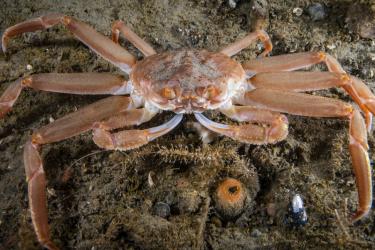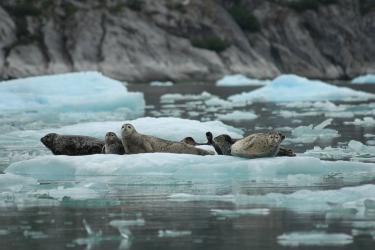When I was growing up in North Carolina, I never thought that I’d find myself in a remote stream in Southeast Alaska wearing a wetsuit and splashing the water with a pole. But in the summer of 2007, I was in that exact situation at NOAA Fisheries' Little Port Walter Marine Research Station, where I was helping to collect, measure, and spawn adult Chinook salmon as part of their long-term aquaculture research program. The experience was part of my 10 week internship as a NOAA Ernest F. Hollings Scholar, one that changed the course of my life, personally and professionally.
I was a sophomore at the University of North Carolina-Chapel Hill, majoring in both Biology and Environmental Science, when someone (I don’t remember who) told me about the scholarship and encouraged me to apply. While the award’s financial support for the last two years of college was certainly appealing, I was most intrigued by the 10 week internship at a NOAA facility. I applied for the award in 2006 and was delighted to learn, weeks later, that I had been selected as a recipient.

All recipients met at NOAA headquarters in Silver Spring, Maryland that summer for scholarship orientation. We were provided a list of potential internship opportunities. We were also encouraged to speak to NOAA employees about possible opportunities, beyond those on the list. Taking this advice to heart, I reached out to numerous individual scientists in the following weeks who were conducting coral reef research in Hawaii, as none of the listed internships had this focus. I had conducted coral reef research for the previous two summers in Florida and was interested in maintaining this focus but in the Pacific Ocean. Plus, who wouldn’t want to spend 10 weeks in Hawaii? Unfortunately, no such opportunities were available, so I went back to the supplied list of internships.
This time, in the absence of my “Hawaii goggles,” I noticed an internship at a remote field station in Alaska that focused on salmon research. At that point in my life, I had never even eaten salmon before, so the research was definitely out of my comfort zone. Yet, the project interested me, and the opportunity to spend 10 weeks in the Alaskan wilderness was too enticing to pass up. Luckily, the internship had not been filled by the time I contacted the NOAA mentor (Frank Thrower), and he offered me the position.

The internship at the Little Port Walter Marine Research Station in the summer of 2007 was, simply put, life-changing. My Hollings research project at the research station became my senior honors thesis at the University of North Carolina-Chapel Hill, for which I received “Highest Honors.” The internship also taught me a number of “life skills” that, as a 21-year-old, I had not yet acquired, including cooking, fishing, boat operation, and a variety of maintenance skills. I also fell in love with the rugged beauty of Alaska and wanted nothing more than to come back after I finished my undergraduate education. Fortunately, through the connections that I established as a Hollings Scholar, I was able to return to the research station for the summer-fall field seasons from 2008-2011.
As my experience grew, so did my desire to pursue a graduate degree and career in fisheries research. I took the leap in 2011 and entered the School of Aquatic and Fishery Sciences at the University of Washington, where I studied risks and management approaches of Pacific salmon conservation hatcheries. I obtained my PhD in 2018 but, through those intervening years, returned to Little Port Walter for a few weeks each summer to assist with their research efforts. In fact, I have been to there every year since my internship and am now the research station's second longest-tenured active researcher. After completing my PhD, I accepted a full time position with the facility that operates Little Port Walter – NOAA’s Alaska Fisheries Science Center, Auke Bay Laboratories in Juneau, AK.
A Few Tips for Future Mentors and Scientists
It’s been 12 years since my Hollings Scholarship internship but the benefits continue to this day. Indeed, my graduate education and current job were completely influenced by my time at the research station. I even met my significant other there during one field season! So, it should come as no surprise when I say that I fully support the Hollings Scholarship and strongly encourage both prospective mentors and applicants to participate in the program.
To prospective mentors, I say that the Hollings Scholarship is a fun opportunity to teach and inspire a motivated individual and to have them participate, if not lead, some of your research efforts. Hollings Scholars are provided stipends by NOAA headquarters, not the host facilities.
Once I get settled as a NOAA employee, I intend to become a Hollings Scholarship mentor with the hope of providing the same positive experiences as my mentor gave me.
To all potential Hollings Scholarship applicants, you should definitely apply for this award! It opened doors that I never knew existed, and the financial boost for the last two years of college is really helpful.
I also encourage all award recipients to seek out internship possibilities even if they are not on the official Hollings list, and to consider those that may not be in your comfort zone. While I did this only after the coral reef possibilities fell through, I am now a firm believer that participating in a different area of research is the best way to help identify what types of research that you like and those that you do not. You’ll never know if you don’t try!
Additional Resources



